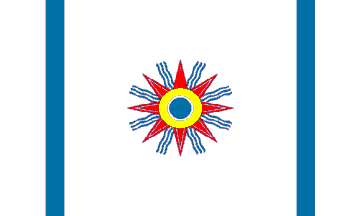
Last modified: 2013-11-08 by zoltán horváth
Keywords: star: 8 points (red) | sun | moon | disc (yellow) | disc (blue) | chaldean | assyrian | rays: 24 (blue) | stripes: 2 (blue) | stripes: vertical (blue) | stripes: 2 (vertical) | tigris | euphrates | river |
Links: FOTW homepage |
search |
disclaimer and copyright |
write us |
mirrors

The Chaldeans are a very old Roman Catholic sect whose home was traditionally in modern Iraq, where a majority of the Chaldeans live, although there is a substantial diaspora as well. The Chaldean liturgy is in Eastern Aramaic.
Ron Lahav, 30 Jan 2008
I would like to turn your attention to the Chaldean flag designed in 1985 by the Chaldean artist, Amer Hanna Fatuhi. It can be found at his website, together with a vast array of other proposals for the Chaldean flag and the explanation that the old Assyrian-Chaldean flag with three stars in the canton was really a Syriac flag.
Christian Kretowicz and Jarig Bakker, 03 Apr 2003
The emblem is extremely similar to the 1959-1963 flag and (especially) arms of Iraq. The designer's website gives lots of background, including the symbolism of the flag:
The Eightfold Chaldean Star Between the Everlasting Rivers, Tigris & EuphratesThe last part refers to the fact that the inspiration for the Chaldean Symbol was an ancient Chaldean-Babylonian stele kept in the Louvre.The two blue vertical lines (1987 versions and on) represent the eternal rivers Tigris and Euphrates which spring from the north and flow into the south of the Mesopotamian Land (The Chaldean Gulf/Tam-Ti-Sha-Mat-Kaldi) in the ancient Kaldee Babylonian language.
The sun (Eightfold Star) represents the Babylonians' symbol of Law and Justice, the two internal circles Yellow (Sun), Blue (Moon) representing the Chaldeans Babylonians' cultural contributions to the human history especially in Astronomy and Math. The eightfold sun is designed in the Mesopotamian Chaldean style, which goes back to 4100 BC proto-Chaldean's pictograph symbols.